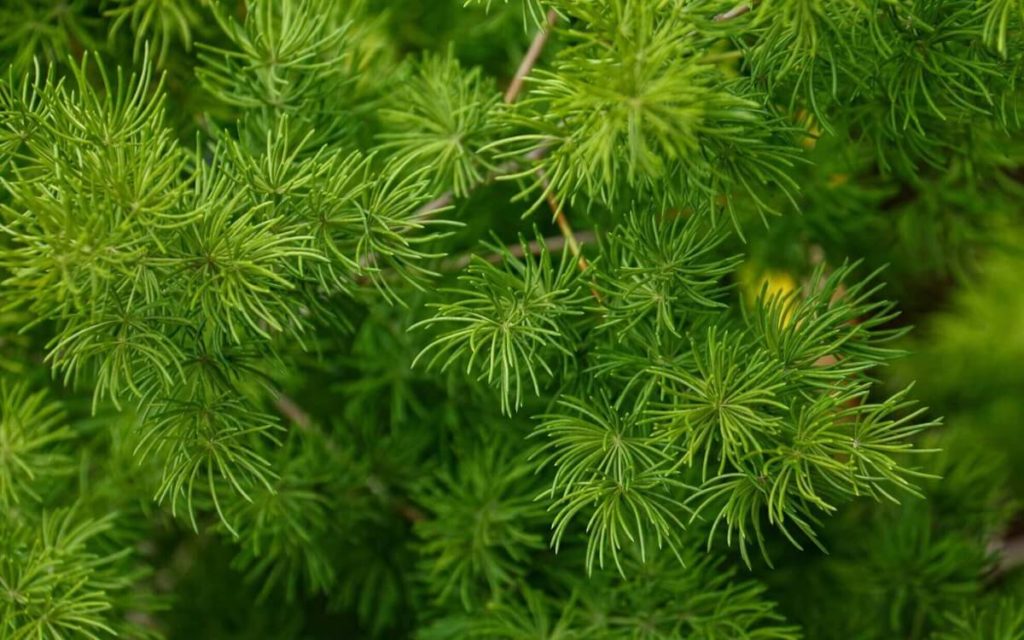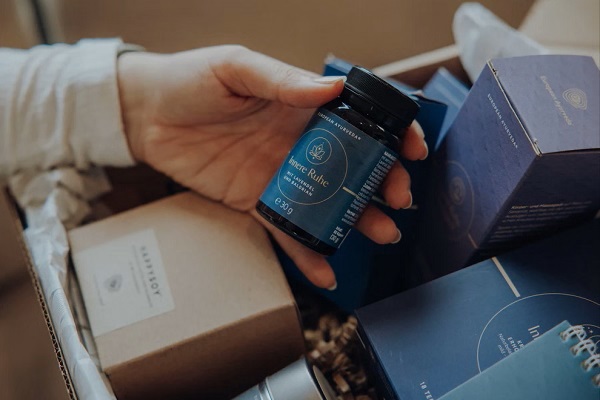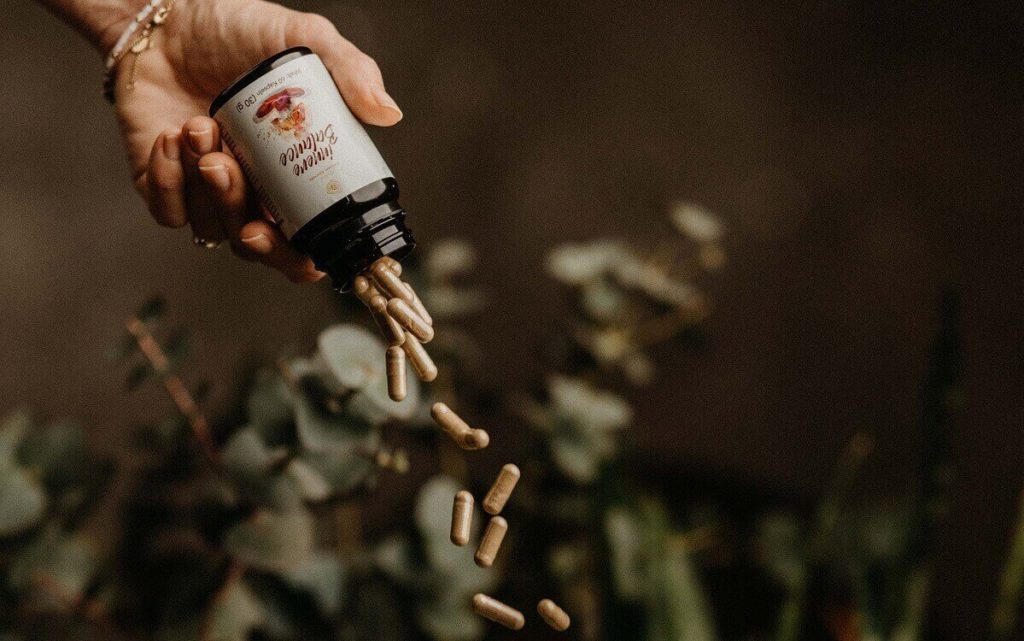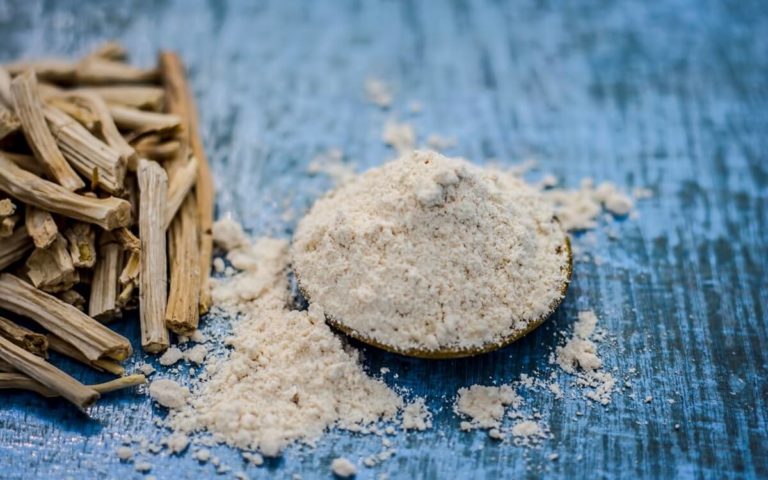Shatavari, also known as Indian asparagus, has always been used in Ayurveda for the well-being of women. It is said to not only increase fertility and act as an aphrodisiac, but also have a rejuvenating effect. However, men can also benefit from the positive effects of this plant. Find out here what makes shatavari so special, how it works and how best to take it.
What is Shatavari?
Shatavari is a small, thorny bush that is mainly native to India and the Himalayas. The plant belongs to the asparagus family and is therefore also known as wild asparagus or Indian asparagus. Its botanical name is Asparagus racemosus.
While the plant is notable for its beautiful white flowers and needle-shaped leaves, it is mainly the shatavari root that is used in Ayurveda.


The name "Shatavari" means something like "a woman who has 100 husbands". As the name suggests, wild asparagus is traditionally used by women to increase fertility. However, both sexes can ultimately benefit from the many positive properties of this Ayurvedic medicinal plant (3).
Shatavari: effect on women and men
Wild asparagus has been used in Ayurveda for centuries for health purposes. It is mainly known as a fertility-boosting tonic for women and men . However, it also strengthens the Kapha dosha and helps to dampen the unstable and hot-tempered characteristics of Vata and Pitta (1). In this way, it is particularly good for body and mind and brings healing energy and balance.
The following effects are attributed to Shatavari in Ayurveda:
Calming, stress-reducing and pain-relieving
Wild asparagus is primarily used to calm the unsteady Vata dosha. It has an anxiety-relieving and nerve-soothing effect and ensures a restful and relaxed night's sleep.
In Ayurvedic medicine, shatavari is therefore traditionally used for sleep disorders or pain. It helps the mind to cope better with stress and to calm down more easily.


Discover the European Ayurveda® Sleep Well Home Treatment now
Transform your sleep in just three weeks! This intensive Ayurveda program for at home can sustainably improve your sleep so that you can start the new day with full energy. Now with our European Ayurveda® Home App: The complete program for better sleep!
Soothes the intestines
Shatavari is not only good for the nerves, however, but is also used to calm the bowels. It protects the mucous membranes and provides pleasant and quick relief from heartburn or diarrhea.
Due to its Kapha-enhancing effect, it also stimulates the appetite and can aid digestion. So your intestines feel good all round! If problems persist, an Ayurvedic colon cleansing or cure can also help.
Has a rejuvenating effect
However, the plant also has a rejuvenating effect for healthy longevity. Thanks to its moisturizing properties, it counteracts age-related dehydration of the tissue and can thus prevent signs of ageing (3). Who needs a fountain of youth when you have this Ayurvedic anti-ageing root?
Strengthens the immune system and has an anti-inflammatory effect
Thanks to its antioxidant properties, shatavari can support the immune system. For example, it can be used as a home remedy for colds or inflammation. It stimulates the formation of immune cells and strengthens your defenses.
It can also ward off negative environmental influences through the antioxidant and adaptogenic effect of the natural saponins, alkaloids, steroids and flavonoids it contains. It can therefore help to regenerate damaged tissue and reduce the effects of oxidative stress and environmental toxins.
Attention:
You should only take dietary supplements after consulting your doctor. The information provided in this article is for educational purposes only and is not a substitute for medical advice! The recommended dietary supplements should be taken at your own discretion.
Shatavari effect on women
Shatavari has a very special relationship with women and has always been used in Ayurveda for their well-being. It has a calming effect on menstrual cramps and helps to regulate the menstrual cycle and alleviate menopausal symptoms. However, the root is also beneficial for many other types of female discomfort.


Shatavari for irregular cycles and PMS
Thanks to the isoflavones (phytoestrogens) it contains, shatavari has a balancing effect on female hormones. It can balance both oestrogen deficiency and excess and thus promote regular, symptom-free menstruation.
This can counteract a stress-related imbalance that also affects the reproductive system. Balance your hormones and alleviate menstrual pain, PMS and an irregular cycle.
Shatavari if you want to have children and during breastfeeding
Many women who have had problems conceiving are said to have had good experiences with taking shatavari. In Ayurveda, Indian asparagus is a traditional remedy for infertility.
It is said to increase fertility and also have an aphrodisiac effect. It not only strengthens the libido, but also the reproductive tissue and rebalances the hormones (4).
Here, too, its balancing effect on hormone levels is crucial for bringing the reproductive system into balance and thus facilitating conception. The shatavari effect on the hormones works thanks to the phytoestrogens it contains, which can balance oestrogen levels and thus rebalance the hormones.
But even after pregnancy, shatavari can continue to support new mothers. Thanks to its moisturizing properties, it promotes milk production and protects the uterus and ovaries from inflammation.
Shatavari during the menopause
The female body undergoes various changes in the course of a woman's life. From an Ayurvedic perspective, the Pitta phase begins in girls from the first menstrual period during puberty and lasts until the menopause. During the menopause, the body enters the Vata phase, which stands for movement, imbalance and restlessness.


Many women find the changes during this time quite difficult. Some feel anxious, nervous or even depressed due to the excess Vata. Here it is important to respond to the changes in the body and calm the Vata somewhat.
According to Ayurveda, the main effect of Shatavari during the menopause is balancing: Taking it can help women to find their center again. Thanks to its moisturizing and cooling properties, it is beneficial for typical menopausal symptoms such as dryness, sweating and heat.
In this way, women of all ages can derive vitality and strength from taking shatavari root (2).
Shatavari effect in men
Indian asparagus is mainly used as an all-rounder for women's problems, but that doesn't mean that men don't also benefit from it. The plant can increase sexual vitality in men. In particular, it can counteract impotence or a decline in libido.
It is also said to increase sperm count and motility and help against inflammation in the reproductive system. In this respect, the plant is similar in its effect to ashwagandha.


Discover high-quality nutritional supplements in our store now
For a balanced diet and more balance - discover our high-quality food supplements and supplements in the European Ayurveda® Shop now!
Shatavari: side effects, interactions and allergies
Shatavari is basically safe to take and there are no known side effects. However, it can have a slight diuretic effect. People with kidney, urinary tract or heart disease should consult their doctor before taking it. If you are taking hormonal medication or blood thinners, you should also consult your doctor beforehand.
However, if you are allergic to asparagus, you should also avoid wild asparagus, as this could lead to the same allergic reactions. Asparagus and shatavari come from the same plant family and can therefore have similar effects on the body.
As the root increases the Kapha dosha, you may also put on a little weight. If you already have a Kapha surplus, we would advise against taking it. There is still no research on taking it during pregnancy. Even if no negative effects are known, if in doubt you should avoid taking the plant if you are pregnant.
Tips for taking shatavari root
If you are now impressed by the positive properties of Indian asparagus, you can see for yourself. Shatavari is usually taken in powder form as a drink or in capsules (5).
When buying, make sure you buy an organic product. The shatavari plants are grown organically, which protects wild stocks. This way you can also be sure that the powder is of high quality.


The shatavari drink is particularly quick to prepare and you only need:
- 1 teaspoon shatavari powder
- 200 ml plant milk
Simply boil the milk, stir in the powder and the drink is ready to enjoy. If you want to enhance the effect, you can also add a teaspoon of ghee and sharkara, Ayurvedic cane sugar.
But perhaps you would prefer a Shatavari tea? In this case, simply replace the milk with hot water. If you are in a particular hurry, you can also take Shatavari capsules.
The dose for the capsules is usually 500 mg and you can take one capsule up to twice a day. Depending on the preparation used, the daily dose can be up to 6 grams. It is best to follow the manufacturer's instructions or the recommendations of your Ayurveda expert.
Shatavari Moon Milk: for restful sleep
If you find it difficult to wind down in the evening and want to balance your excess Vata dosha, try a delicious Moon Milk with Shatavari. Not only is it tasty, it also helps your body and mind to get ready for bed.
All you need is:
- 250 ml plant milk
- 1 teaspoon shatavari powder
- 1 teaspoon cocoa powder
- 1 teaspoon cinnamon
While you heat the milk in a saucepan, you can mix the remaining ingredients together in a bowl. Once the milk is warm enough, simply mix in the powder mixture and stir for about two minutes. The Moon Milk is then ready to drink!
With its rejuvenating and calming qualities, Shatavari supports both women and men in their sexual vitality. It is worth trying this unique root as an Ayurvedic drink!


Ayurveda during the menopause: finding balance with knowledge & self-reflection
The menopause - called "Rajonivritti" in Ayurveda - does not mark the end, but the beginning of a new phase of life. Ayurveda does not regard the menopause as an illness, but as a natural transition that can be gently accompanied by a conscious lifestyle.
Cover picture: © mirzamlk - istockphoto.com (file no.: 899906916)
Sources
(1) Thakur, S. et al. (2021). Shatavari (Asparagus Racemosus) - The Best Female Reproductive Tonic. International Journal of Research and Review 8(5), 73-84. DOI: https://doi.org/10.52403/ijrr.20210511.
(2) Gudise, V. et al. (2024). Efficacy and Safety of Shatavari Root Extract for the Management of Menopausal Symptoms: A Double-Blind, Multicenter, Randomized Controlled Trial. Cureus 16(4), 1-15. DOI: https://doi.org/10.7759/cureus.57879.
(3) Irakee, A. et al. (2025). Recent research and uses of asparagus racemosus (Shatavari). International Journal of Therapeutic Innovation 3(2), 6-9. DOI: https://doi.org/10.55522/ijti.v3i2.0108.
(4) Meher, K. et al. (2025). Understanding the Role of Shatavari (Asparagus racemosus) in Enhancing Female Fertility aTraditional Perspective. International Journal of Ayurveda and Pharma Research 13(3), 104-110. DOI: https://doi.org/10.47070/ijapr.v13i3.3642.
(5) Akhtar, S. et al. (2024). Exploring pharmacological properties and food applications of Asparagus racemosus (Shatavari). Food Chemistry Advances 4, 1-14. DOI: https://doi.org/10.1016/j.focha.2024.100689.






